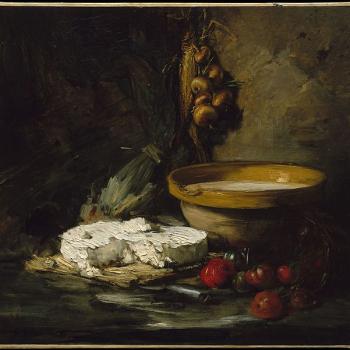
In the church of my youth, we were taught ‘The Roman Road,’ which was presented as a series of verses in Romans that, if followed, are steps leading to salvation. Step one is acknowledging that we are sinners. Romans 3:23: “All have sinned and fall short of the glory of God.”
The second step is accepting that, as sinners, we deserve death. Romans 6:23: “The wages of sin is death, but the gift of God is eternal life in Christ Jesus our Lord.”
I no longer believe that is a correct interpretation of this verse. The idea I was presented with as a child was that God will demand our deaths as a wage unless we receive Jesus as Lord. The clear implication of this is that Jesus didn’t come to save us from sin and death but from his angry dad.
If we look more closely at the verse, it seems clear that the paymaster (the one demanding our death) is sin rather than God. We are talking about ‘the wages of sin,’ after all. The text contrasts the demands of the paymaster (sin) with the ‘gift of God’ – sin kills, but God freely gives. The two energies could not contrast more sharply.
What is sin?
To make sense of this, we must first understand sin. As discussed in a previous article, the root of sin is judgment. In fact, I believe that judgment was the original sin, starting with judgment of the self, followed by judgment of others and of God. All harmful actions and attitudes understood as sinful grow from this root. I firmly believe that sin is anything that harms ourselves or other people, which is why our God of love would have us be free of it.
God is not arbitrary, penning long lists of forbidden activities and punishing people accordingly. Nor is he squeamish, watching in shock as events unfold on Planet Earth. He is not a snowflake, easily offended by his creation. The Lord is not kept at bay by sin, unable to draw near to us until we’re free of it. Nor is he a cosmic conservative dad, mistrusting ‘liberals’ and longing rheumy-eyed for ‘the good ol’ days.’ The notions of sin I’ve come across in various expressions of the Church are woefully shallow, and most boil down to some kind of list of forbidden activities.
Personally, I feel we should take all notions of punishment out of the equation and think of sin simply as harm. God would have us live free of sin because it is better for us, for our loved ones, and for everyone we encounter. He is for us, not against us.
Romans 6:23 is best understood in this light. The consequences of sin are death, whether that be the death of our relationships, our inner peace, our physical well-being, or any other expression of loss. These are the wages of sin, but God would set us free from all this harm. It is a simple equation in the end.
1 Corinthians 15:55-58 makes it abundantly clear who Jesus fought and defeated on the cross – the two great enemies of humanity, sin and death.
“Where, O death, is your victory? Where, O death, is your sting?” The sting of death is sin, and the power of sin is the law. But thanks be to God! He gives us the victory through our Lord Jesus Christ.
Jesus didn’t die ‘in your place’
Another idea I was brought up with is that Jesus took the punishment we deserve. Literally, that we should have hung there, which makes no sense at all. First of all, being crucified wouldn’t erase our sin; it would just kill our bodies. We would still, according to the theology I was brought up with, have to spend eternity in Hell for our sins.
Jesus wasn’t crucified in our place. He was crucified to accept the wages (consequences) of sin for all of us – the harm that sin itself would impose on our bodies, souls, and spirits – but it is totally invalid to suggest you or I deserve to be crucified. Jesus chose to accept sin’s paycheck and tore it up, destroying both sin and death for our sake. I appeal to parents reading this – please don’t tell your kids they deserve to die for their sins. Don’t tell them their righteousness is as filthy rags before God or that they are ‘totally depraved.’ And for Heaven’s sake, don’t tell them that sin creates a barrier between them and God until they repent. The damage lasts a lifetime.
Jesus didn’t die to save us from his angry dad. He died to save us from sin, which would otherwise result in our spiritual and physical death. Along with defanging these two enemies, Jesus gave us the gift of eternal life, which reflects the generous and loving nature of God. God is in the healing and restoring business, and nothing else. He has never demanded our death.
It is sin that pays a wage, but God offers us the gift of Life without condition. That gift is a generous, all-inclusive embrace that we can utterly rely on.
The ministry of reconciliation
The Father, Son, and Spirit all attend to the same ministry – the ministry of reconciliation. 2 Corinthians 5:18-21:
“All this is from God, who reconciled us to himself through Christ and gave us the ministry of reconciliation: that God was reconciling the world to himself in Christ, not counting people’s sins against them. And he has committed to us the message of reconciliation. We are therefore Christ’s ambassadors, as though God were making his appeal through us. We implore you on Christ’s behalf: Be reconciled to God. God made him who had no sin to be sin for us, so that in him we might become the righteousness of God.”
Even during the agonies of crucifixion, Jesus was ministering reconciliation. When the thief on the cross reached out to him, Jesus welcomed him into paradise. As his life was fading, he expressed the heart of God in the simplest of statements. Luke 23:34:
“Father, forgive them, for they don’t know what they are doing.”
This is the business of the Father and the purpose of the cross – not dishing out punishment, but reconciling us to himself and each other.
Note from the author: I wrote a book on judgment as the root of all sin called Who Am I to Judge? under the pseudonym James Bewley. It’s available on all regional Amazon sites.
10/8/2024 3:46:54 PM





